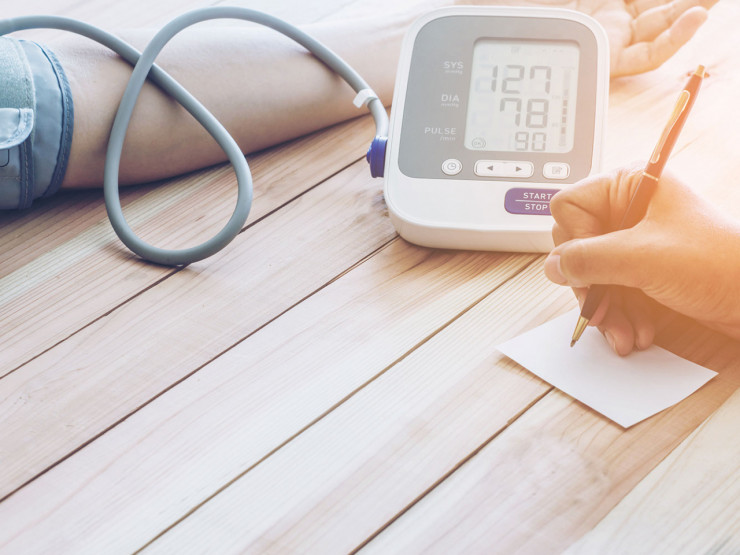As your heart beats, it pumps blood around your body supplying both the oxygen and energy that it needs. As the blood moves through your system, it exerts force against the sides of your blood vessels. The strength of this force is your blood pressure.
When your blood pressure is too high, it places extra strain on both your blood vessels and your heart. This is called high pressure and over time it can lead to a number of different health problems, including:
Stroke
Heart attack
Kidney problems
Dementia
Heart failure
Peripheral arterial disease.
Aortic aneurysm
Kidney disease
For that reason it’s particularly important that you regularly check your blood pressure, with high-blood pressure more likely to develop after the age of 40.
You can check your blood pressure yourself with a home blood pressure monitor, visit your local branch of Whitworth or speak to your GP.
How is blood pressure measured?
Blood pressure is measured with a blood pressure monitor. This is an inflatable cuff that is placed around your bare upper arm. It is either manually or automatically inflated until no blood can flow through your arteries. Then the air is slowly let out and the blood can start to flow again. This then takes a measurement of your blood pressure which is expressed in terms of numbers.
What do the blood pressure numbers mean?
Your blood pressure measurement will be presented as two numbers such as 120/80.
The first number is called your ‘systolic blood pressure’. This tells you the pressure when your heart is pumping blood around your body. The second is called your ‘diastolic blood pressure’ and measures when your heart is resting.
When taken together, these numbers provide an accurate picture of your overall heart and artery health.
The NHS has an excellent easy calculator that allows you to enter your numbers and find out what they mean. Find it here.
What is high blood pressure?
High blood pressure is when one of these readings is higher than average- between 90/60 and 120/80. This applies to all ages, whether you’re in your twenties or in your nineties.
Although we don’t want your blood pressure readings to be high, this doesn’t always point to a problem. Your blood pressure can be affected by many things, including physical activity, drinking tea, coffee and cola or even eating chocolate.
If you believe there could be a problem, it’s a good idea to take several blood pressure readings to gain a better idea. Should the problem continue, contact your local pharmacy to verify the readings and assess if any further action is required.
How will I know if I have high blood pressure?
What makes high blood pressure so dangerous is that there are very few signs that you experience. It rarely has symptoms and in many cases the first signs that you have it may be a heart attack or a stroke. This is one of the reasons why it’s known as the silent killer. The only way to find out if you have high blood pressure is to have a blood pressure check.
If you have very high blood pressure it could present itself with a number of symptoms. These include:
Headaches
Bloodshot eyes
Feeling sick or generally unwell
If you have any of these symptoms you should visit your GP.
What about low blood pressure?
Low blood pressure is defined as less than 90/60 and is usually nothing to worry about.
However, for some people, low blood pressure can signal an underlying problem, especially if it drops suddenly or is accompanied by signs and symptoms such as:
Dizziness or feeling lightheaded
Fainting
Blurred or fading vision
Nausea
Fatigue
Lack of concentration
If you start experiencing any of these, it’s time to consult your GP.
How can you manage your blood pressure?
The first line of defence against developing high blood pressure is a healthy lifestyle and there are a number of measures you can take to keep your blood pressure stable. As with other health issues, maintaining a healthy lifestyle can prevent problems from developing over time. To reduce your risk of developing high blood pressure you should:
Reduce salt intake and eat balanced diet
A healthy diet is one that’s low in salt and rich in lots of fruit and vegetables. Look for low-salt alternatives and add less or remove it when cooking. Too much caffeine has also been linked to high blood pressure.
Reduce your alcohol intake
High levels of alcohol intake can impact on your blood pressure. Try to limit your alcohol consumption to no more than 14 units a week.
Give up smoking
Among the many health risks associated with smoking is high-blood pressure. It causes your arteries to narrow and places more stress on your heart.
Lose weight
If you’re overweight your heart has to work harder. This puts you at greater risk of a range of health issues, with high blood pressure being one of them.
Keep active
Whether it’s going for a walk, cycling to work or heading to the gym, try to build at least 30 minutes of activity into your life every day. This helps to reduce your risk of a range of health risks, particularly as you age, and can also help improve your mood.
Know your numbers
Even if you lead a relatively healthy lifestyle, it’s still important to know and understand your blood pressure numbers. It can give you important information about a key aspect of your health, especially as you get older. The more information you have, the easier it is to prevent potentially life-limiting problems from developing.
Whatever your age, it’s important to know your blood pressure and take steps to keep it under control.
Whitworth Pharmacy makes knowing your blood pressure simple.
Visit our online store to purchase your home blood pressure monitor or pop into your local branch to get your blood pressure checked for free.



